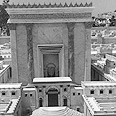
True, the destruction of the temple destroyed the foundation of Jewish culture in those days. The site was a holy place, in spiritual and cultural terms, while also serving as an economic, social and political center for the Jewish people. The destruction influenced all areas of Jewish life, and it led to the loss of life and sovereignty and exile.
Therefore, Tisha B'Av has been observed for generations as a day of mourning to mark the terrible tragedy that befell the Jewish people. But was the destruction purely negative?
Positive effects
The destruction of the temple also symbolized the end of a transition period to a new, progressive period for Jewish culture. First of all, the destruction freed Judaism from dependence on a holy place and turned it into a universal culture: I am no longer required to live in Jerusalem, or even in Israel, in order to be a complete Jew.
The transformation of the synagogue led to the possibility that people could observe religious rituals and reach spiritual heights in their home countries.
Secondly, the destruction freed Judaism from an elitist priesthood that claimed it was the only sector that could serve as a bridge between God and the masses. Once the temple was erased, the priests' status was also erased, and Judaism was changed. No longer would the mantle of leadership be passed from father to son; rather, leadership would rest on ability and be open to all.
The spiritual leadership of the priests was transferred to the sages, thus opening the way for all Jews to study and lead, provided they had appropriate abilities.
Pluralistic faith
Third, the transfer of leadership to the priests drastically changed the way laws and the framework of Jewish life were reached – the move from individual power vested with the high priest to a culture of pluralistic argument and debate amongst sages, who agreed that all points of view were words of the living God.
Truth lies not with a single, elitist family, that keeps knowledge amongst themselves and makes sure the priestly race remains pure. Rather, every person, according to his world view and personal thoughts, has the right to interpret the holy writings.
Fourth, the destruction freed Judaism from a primitive stage of religious, idolatrous rites to progressive rites of prayer. The discontinuation of animal sacrifice and move to prayer, brought believers, each according to his or her world view, to a position in which people can connect to God without having to bring presents.
The destruction of the temple could have led to the annihilation of the Jewish people, but Judaism dealt with the loss of independence by utilizing creative forces and vast changes in order to continue to exist as a nation. The sages of those generations found substitutes for the temple that had served as a glue to unify the people, and brought Jewish culture to time that reduced the influence of idol worship.
Celebrating Tisha B'av
For all these reasons, Tisha B'av and the "Between the tragedies" period need not be marked by mourning. Rather, we should focus on ideas of celebration and creativity as we deal with the challenges that face Jewish culture. This message became even stronger following the establishment of Israel. The 2,000-year hope to spend next year in rebuilt Jerusalem has been realized. Almost any Jew can exercise his right to live in Jerusalem.
Therefore, the idea of mourning the sacking of Jerusalem pales in comparison to the renewed sovereignty built in front of our very eyes. The message of the destruction of the temple is no longer relevant.
Moreover, even if the political situation were to be created in which a third temple could be built, it would be a mistake for Jewish culture. We must free ourselves from the skewed, perverted vision of restoring the temple. We have no need for it.
We have no need to offer animal sacrifices, we do not believe that a high priest should decide Jewish law. There is no need to mourn the destruction. Jewish culture has advanced. We must continue this process.
The messages of Tisha B'av are irrelevant for secular Jews. But instead of ignoring this day (which is what most people do), I believe it is a particularly important day for the secular public, because the changes brought about by the destruction brought Judaism to an alternate reality of prayer and celebration, pluralism and blossoming.
Therefore, Tisha B'av should be a day for secular Jews to express their Judaism and to feel a connection to it, for the main message left from the destruction is pluralism. Secular Jews must not ignore this message and leave Judaism to the religious. There is no one Judaism. Tisha B'av is the perfect day to express that.
Guy Oren is a founder of the "Temura " Institute for Secular Humanistic Judaism















